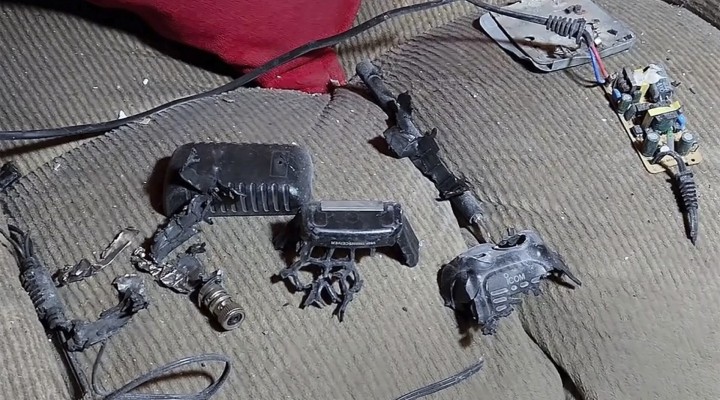The attacks this week mark the largest hit suffered by Hezbollah since Hamas’ Oct. 7 attacks on Israel plunged the region into conflict — and may open a new phase to the ongoing low-grade war between Israel and Lebanon. Israel has not claimed responsibility for the attacks but is seen as behind them, with the New York Times reporting that shell companies backed by Israeli intelligence — at least one of them the Hungary-based BAC — manufactured the pagers that were laced with explosives. The scale and the direction of the conflict hinges on next moves by both Israel, which has continually acted to escalate regional tensions, and Hezbollah, which to date has opted for controlled responses in a bid to avoid opening up a full-on Israel-Lebanon war.
Damage Done
The explosions of low-tech pagers and walkie-talkies used by members of Hezbollah consecutively on Tuesday and Wednesday marked an unprecedented intelligence operation that killed over 30 people, including four children and one health worker, and injured more than 3,000. The pager blasts also claimed the life of the son of Hezbollah MP Ali Ammar and injured Iran’s ambassador to Lebanon, Mojtaba Amani. “Hezbollah understands this is a breach to its security,” says military analyst and veteran war correspondent Elijah Magnier. “The war is a battle, one day we are against our enemy and one day our enemy is against us, and Tuesday and Wednesday were bloody for us,” Hezbollah leader Hassan Nasrallah said in a speech Thursday, also calling the attacks “the highest level of criminality.”
The deadly pager and walkie-talkie explosions followed a visit by US Special Envoy Amos Hochstein to Israel in an attempt to prevent further escalation with Hezbollah, and an unexpected hypersonic missile attack on central Israel by Yemen’s Houthis on Sunday.
What Next: Israel
For Hezbollah, what’s surprising is that the Israelis did not take advantage of the asymmetric attacks on Tuesday and Wednesday, considering that both hits were effectively a “methodical introduction” for war — a ruse to create panic and chaos to distract from a military operation — a source close to Hezbollah told Energy Intelligence. “Do they still have more steps? Or are they avoiding war and sending deterrence messages?” he asked.
One take is that the attacks show that Israel is overwhelmed with the cost of opening up a northern front. The Israelis “saw they are unable to get Hezbollah to back down and halt the war, so they resorted to these attacks,” the source said.
Magnier suggested something similar, noting that every time Israeli Prime Minister Benjamin Netanyahu is under pressure to go to war, he undertakes a similar operation. “This will lift the pressure off of him to go to a wider military operation that would be unproductive with no strategic gains” and likely see him fail to achieve the objective of returning displaced residents to the north, he said — arguing the attacks will forestall wider military operations for now. “The Israelis have registered a victory. Why would they go into a war they know they can’t win?” Magnier asked.
At the same time, peace is of course unlikely to break out. In his Thursday evening speech, Nasrallah said that Hezbollah had “received messages that their goal from this strike is to stop the fighting on the Lebanese front, and if you do not stop, we have more.” Israel wants to return the some 60,000 evacuated residents to the northern border area, and ensure that they will be safe from any future attacks.
Israeli wider motivations and intentions nonetheless remain blurry. Earlier this week, reports had been emerging around Netanyahu’s intention to replace Defense Minister Yoav Gallant. Those came as Israel’s cabinet signed off on a new official war goal to return displaced citizens to the north and Gallant told the US’ Hochstein that “the only way left” to achieve that goal was “military action.”
But in the view of Mounir Shehadeh, a military expert and former Lebanese government coordinator to the UN Nation Interim Force in Lebanon, the Israeli army is not ready for a ground operation at the Lebanese border, with airstrikes the preferred approach. “The Israeli army wants to create a 10 kilometer security belt into the border by clearing the area — and therefore widen the airstrikes into this area,” he said.
What Next: Hezbollah
Nasrallah said Thursday that this week’s “unprecedented aggression … will be met with a severe reckoning and just punishment from where they expect and from where they do not expect.” Operations at the border have continued with the same tit-for-tat between Hezbollah and the Israel Defense Forces, with Hezbollah stating that it will maintain the front in support of Palestine — indicating that the group remains undeterred despite the blow inflicted by Israel through these attacks.
But questions remain around the shape of the promised response. “Hezbollah doesn’t want a larger war. And because of that, any retaliation will not be of the same size” as Israel’s, Magnier argued. “They will need to think of something different and send a message to the Israelis that they retaliated,” he added. Following an Israeli attack on the Beirut suburb that killed Hezbollah commander Fouad Shukur in July, Hezbollah’s retaliation, mainly targeting Israeli military bases but which reportedly included an intention to strike Israel’s military intelligence unit 8200 at the Glilot base, was partly tempered by Israeli preemptive strikes that immediately preceded it.
Given the latest unprecedented breach to Hezbollah’s security, however, Shehadeh argued that the group, which usually studies and selects its targets so as not to give Israel an excuse to widen the war, may seek a proportionate — and potentially escalatory — response. “This time, whatever the cost, Hezbollah’s response will be proportional,” he said.
https://www.energyintel.com/00000192-0914-dd37-a5fa-2b9cbe190000
 TheAltWorld
TheAltWorld 

0 thoughts on “What Next After Lebanon Pager Blasts”